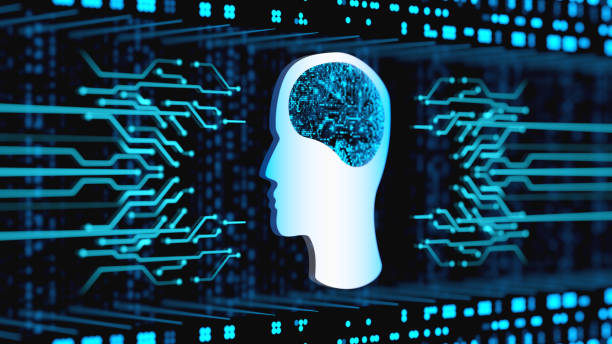What is Artificial Intelligence and What are its Applications?

#Artificial_Intelligence (AI) is a branch of computer science that deals with building machines capable of performing tasks that typically require human intelligence.
These tasks include learning, problem-solving, pattern recognition, natural language understanding, and decision-making.
Artificial intelligence is designed with the goal of creating systems that can think, learn, and act like humans.
The applications of artificial intelligence are very broad and diverse.
Some of the most important applications include:
- Medicine: Disease diagnosis, drug development, robotic surgery
- Finance: Fraud detection, risk management, algorithmic trading
- Transportation: Self-driving cars, route optimization, traffic management
- Manufacturing: Industrial robotics, quality control, process optimization
- Customer Service: Chatbots, virtual assistants, answering questions
- Education: Adaptive learning systems, automated assessment, personalized learning
In fact, artificial intelligence is transforming all aspects of our lives and is expected to play a much more important role in the future.
With the ever-increasing advancements in this field, new possibilities are being created to solve complex problems and improve the quality of human life.
This field is rapidly growing and evolving, and it has also created many job opportunities.
Does your company’s website perform as well as your brand deserves? In today’s competitive world, your website is your most important online tool. Rasaweb, a specialist in designing professional corporate websites, helps you to:
✅ Gain customer credibility and trust
✅ Convert website visitors into customers
⚡ Get a free consultation!
Types of Artificial Intelligence, Approaches, and Differences

Artificial intelligence can be categorized based on various criteria.
One of the most common methods is categorization based on the abilities of artificial intelligence:
- Weak AI (Narrow AI): This type of artificial intelligence is designed to perform a specific task and does not have the ability to perform other tasks.
Most of the artificial intelligence systems used today are of this type.
For example, a facial recognition system or a chatbot. - Strong AI (General AI): This type of artificial intelligence has an intelligence similar to humans and can do anything that a human can do.
Strong artificial intelligence is still in the research stage and has not yet been fully realized. - Super AI (Super AI): This type of artificial intelligence surpasses human intelligence and can do things that humans are not capable of doing.
Super artificial intelligence is a hypothetical concept and does not yet exist.
There are various approaches to building artificial intelligence systems, including:
- Machine Learning (Machine Learning): In this approach, the system learns using data and improves its performance without the need for explicit programming.
- Deep Learning (Deep Learning): A subset of machine learning that uses deep neural networks to learn patterns from data.
- Fuzzy Logic (Fuzzy Logic): This approach uses fuzzy logic to model uncertainty and ambiguity.
- Expert Systems (Expert Systems): These systems use the knowledge of an expert to solve problems.
Choosing the right approach depends on the type of problem and the available data.
Each approach has its own advantages and disadvantages.
Machine Learning and its Role in the Development of Artificial Intelligence

Machine Learning (ML) is a key area in the development of artificial intelligence.
This approach allows systems to learn from data and improve their performance without explicit programming.
In other words, instead of being instructed on how to perform a task, the system is given data to learn patterns and relationships from.
There are different types of machine learning algorithms, including:
- Supervised Learning (Supervised Learning): In this type of learning, the system is trained using labeled data.
Labeled data includes inputs and expected outputs. - Unsupervised Learning (Unsupervised Learning): In this type of learning, the system is trained using unlabeled data.
The goal is for the system to discover hidden patterns and structures in the data. - Reinforcement Learning (Reinforcement Learning): In this type of learning, the system learns how to make decisions that maximize reward by interacting with an environment.
Machine learning is used in a wide range of applications, including:
- Image Recognition: Recognition of faces, objects, and scenes in images
- Natural Language Processing: Language translation, sentiment analysis, answering questions
- Prediction: Sales forecasting, weather forecasting, risk prediction
- Recommenders: Movie, product, and news recommendations
| Machine Learning Algorithm | Type of Learning | Application |
|---|---|---|
| Linear Regression | Supervised | Predicting house prices |
| K-Means Clustering | Unsupervised | Customer Segmentation |
| Q-Learning Reinforcement Learning | Reinforcement | Playing games |
Machine learning plays a very important role in the development of artificial intelligence and allows systems to perform complex tasks automatically and with high accuracy.
Natural Language Processing (NLP) and Machine Language Understanding

Natural Language Processing (NLP) is a branch of artificial intelligence that enables machines to understand and process human language.
This includes analysis, interpretation, and generation of natural language.
NLP applications are very diverse, including:
- Machine Translation: Translating texts from one language to another
- Sentiment Analysis: Detecting emotions in text
- Text Summarization: Generating a short summary of a long text
- Chatbots: Creating conversational bots that can interact with humans
- Speech Recognition: Converting speech to text
- Text Generation: Generating text automatically
Various techniques are used for natural language processing, including:
- Parsing: Analyzing the grammatical structure of a sentence
- Semantic Analysis: Understanding the meaning of a sentence
- Named Entity Recognition: Identifying and categorizing named entities such as names of people, organizations, and places
- Language Modeling: Predicting the next word in a sentence
Natural language processing plays a very important role in the development of artificial intelligence and allows machines to interact with humans more naturally and effectively.
Recent advances in this field have provided new possibilities for solving complex problems and improving the quality of human life.
Your online sales aren’t what you expect? With Rasaweb, solve the problem of low sales and poor user experience forever!
✅ Significantly increase visitor-to-customer conversion rates
✅ Create an enjoyable user experience and increase customer trust
⚡ Take action now for a free consultation!
Deep Neural Networks (Deep Learning) and their Architectures

Deep Learning is a subset of machine learning that uses deep neural networks to learn patterns from data.
Deep neural networks are made up of multiple layers of artificial neurons that allow them to learn more complex patterns than traditional neural networks.
There are different architectures for deep neural networks, including:
- Convolutional Neural Networks (CNNs): These networks are very suitable for processing images and videos.
They use convolutional layers to extract features from images. - Recurrent Neural Networks (RNNs): These networks are very suitable for processing sequential data such as text and audio.
They use recurrent layers to remember information from previous steps in the sequence. - Generative Adversarial Networks (GANs): These networks are used to generate new data that is similar to the training data.
They consist of two neural networks: a generator network that generates new data and a discriminator network that tries to distinguish generated data from real data. - Transformers (Transformers): A new architecture that has been very successful for natural language processing.
Transformers use attention mechanisms to focus on the important parts of a sentence.
Deep neural networks are used in a wide range of applications, including:
- Image Recognition: Recognition of faces, objects, and scenes in images
- Natural Language Processing: Language translation, sentiment analysis, answering questions
- Text Generation: Generating text automatically
- Playing games: Playing complex games like Go
Deep learning plays a very important role in the development of artificial intelligence and allows systems to perform complex tasks with high accuracy.
Recent advances in this field have provided new possibilities for solving complex problems and improving the quality of human life.
Ethics in Artificial Intelligence: Considerations and Challenges

The development of artificial intelligence is accompanied by important ethical challenges.
One of the most important of these challenges is the issue of bias.
If the data used to train artificial intelligence systems is biased, the system will also be biased.
This can lead to discrimination and inequality.
Other ethical challenges include:
- Transparency: Artificial intelligence systems often act as black boxes, meaning that it is difficult to understand how a decision was made.
This can lead to distrust and concern. - Accountability: If an artificial intelligence system makes a mistake, who is responsible? This question still does not have a clear answer.
- Privacy: Artificial intelligence systems often require large amounts of personal data.
This can lead to privacy concerns. - Employment: Artificial intelligence can lead to job losses.
To address these ethical challenges, it is necessary to:
- Collect unbiased training data.
- Design artificial intelligence systems to be more transparent and understandable.
- Determine accountability for the decisions of artificial intelligence systems.
- Respect individuals’ privacy when using artificial intelligence systems.
- Create programs to train and retrain workers for new jobs.
Ethics in artificial intelligence is a complex and multifaceted issue that requires serious attention.
By considering ethical considerations, the benefits of artificial intelligence can be harnessed and its risks avoided.
The Future of Artificial Intelligence: Predictions and Possibilities

The future of artificial intelligence is very bright and full of possibilities.
Artificial intelligence is expected to play a more important role in all aspects of our lives.
Some of the predictions include:
- Expansion of artificial intelligence in various industries: Artificial intelligence is already used in many industries and is expected to expand into more industries in the future.
- Development of strong artificial intelligence: Although strong artificial intelligence is still in the research stage, recent advances in this field have increased hope for its realization.
- Increased human-machine interaction: With the advancement of artificial intelligence, human-machine interaction will become more natural and effective.
- Creation of smarter and more automated systems: Artificial intelligence systems will be able to perform more complex tasks automatically in the future.
- Change in the nature of work: Artificial intelligence can lead to a change in the nature of work.
Some jobs will be lost, but new jobs will also be created.
Of course, the development of artificial intelligence is also accompanied by risks.
One of the most important of these risks is the issue of control.
If artificial intelligence gets out of control, it could have disastrous consequences.
However, with proper management and attention to ethical considerations, the benefits of artificial intelligence can be harnessed and its risks avoided.
The future of artificial intelligence is in our hands.
| Area | Impact of Artificial Intelligence |
|---|---|
| Medicine | Faster and more accurate disease diagnosis, development of new drugs |
| Transportation | Self-driving cars, traffic optimization |
| Manufacturing | Increased productivity, reduced costs |
How Can Artificial Intelligence Improve Daily Life?

Artificial intelligence has great potential to improve our daily lives.
Some of the ways that artificial intelligence can improve our lives include:
- Improving healthcare: Artificial intelligence can help doctors diagnose diseases faster and more accurately.
It can also play a role in developing new drugs and more effective treatments. - Improving transportation: Self-driving cars can reduce traffic and increase road safety.
Also, artificial intelligence can play a role in optimizing routes and reducing travel time. - Improving education: Adaptive learning systems can personalize education for each individual and make learning more effective.
- Improving customer service: Chatbots and virtual assistants can answer customer questions and solve their problems.
- Improving security: Facial recognition and fraud detection systems can increase security.
In addition, artificial intelligence can help us with repetitive and tedious tasks, free up our time and energy, and allow us to focus on more important tasks.
Artificial intelligence can help us lead healthier, safer, and more efficient lives.
Do you have an online store but your sales are not what you expect? Rasaweb with professional online store design, solves your problem forever!
✅ Dramatic increase in conversion rates and sales
✅ Unique user experience for your customers
⚡ Click to get a free consultation with Rasaweb!
Job Opportunities Related to Artificial Intelligence

With the ever-increasing expansion of artificial intelligence, many job opportunities have been created in this field.
Some of the most popular jobs related to artificial intelligence include:
- Data Scientist (Data Scientist): Data scientists are responsible for collecting, analyzing, and using data to solve business problems.
They use machine learning algorithms to predict, classify, and cluster data. - Machine Learning Engineer (Machine Learning Engineer): Machine learning engineers are responsible for designing, developing, and deploying machine learning systems.
They must have a deep knowledge of machine learning algorithms as well as programming skills. - Natural Language Processing Engineer (Natural Language Processing Engineer): Natural language processing engineers are responsible for developing systems that can understand and process human language.
They use various NLP techniques to translate languages, analyze sentiments, and answer questions. - AI Researcher (AI Researcher): Artificial intelligence researchers seek to advance knowledge in the field of artificial intelligence.
They develop new algorithms and find new ways to solve complex problems. - AI Architect (AI Architect): Artificial intelligence architects are responsible for designing and implementing artificial intelligence infrastructures.
They must have a deep knowledge of the hardware and software required for artificial intelligence systems.
To succeed in these jobs, it is necessary to have the following knowledge and skills:
- Knowledge of mathematics and statistics: To understand machine learning algorithms and analyze data, you need a strong knowledge of mathematics and statistics.
- Programming skills: To implement machine learning algorithms and develop artificial intelligence systems, you need programming skills.
- Knowledge of machine learning: To use machine learning algorithms and solve business problems, you need a deep knowledge of machine learning.
- Problem-solving skills: To find creative solutions to complex problems, you need problem-solving skills.
- Communication skills: To present the results of your research to others and collaborate with other experts, you need communication skills.
Given the rapid growth of this field, training and staying up-to-date with the latest technologies is very important.
Artificial Intelligence Learning Resources

Artificial intelligence learning resources are very diverse and include books, online courses, scientific articles, and practical projects.
Some of the best artificial intelligence learning resources include:
- Online Courses: Various platforms such as Coursera, edX, Udacity, and Khan Academy offer artificial intelligence training courses.
These courses are usually taught by professors from reputable universities and cover the material in a comprehensive and practical manner. - Books: There are many books on artificial intelligence that cover basic and advanced concepts.
Some of the most popular artificial intelligence books include “Artificial Intelligence A Modern Approach” by Stuart Russell and Peter Norvig, “Deep Learning” by Ian Goodfellow, Yoshua Bengio and Aaron Courville, and “The Elements of Statistical Learning” by Trevor Hastie, Robert Tibshirani and Jerome Friedman. - Scientific Articles: Scientific articles contain the latest research findings in the field of artificial intelligence.
To access scientific articles, you can use databases such as Google Scholar and arXiv. - Practical Projects: The best way to learn artificial intelligence is to do practical projects.
By doing practical projects, you can apply your theoretical knowledge and strengthen your practical skills. - Online Forums and Groups: Participating in online forums and groups can help you connect with other artificial intelligence enthusiasts and learn from their experiences.
To start learning artificial intelligence, you can get familiar with basic concepts such as machine learning, deep learning, natural language processing, and neural networks.
Then, you can learn a programming language like Python and start doing practical projects.
The most important thing is to be patient and keep learning.
Frequently Asked Questions
| Question | Answer |
|---|---|
| 1. What is Artificial Intelligence (AI)? | It is a branch of computer science that aims to create machines capable of simulating human intelligence and performing tasks that require human thinking, such as learning, problem-solving, and decision-making. |
| 2. What are the main types of Artificial Intelligence? | They can be classified into weak artificial intelligence (Narrow AI) focusing on a specific task, general artificial intelligence (General AI) possessing comprehensive human capabilities, and super artificial intelligence (Super AI) exceeding human intelligence. |
| 3. Mention some common Artificial Intelligence applications in our daily lives. | These include voice assistants (such as Siri and Alexa), recommendation systems (such as Netflix and Amazon), self-driving cars, facial recognition systems, and spam filters. |
| 4. What is the difference between Artificial Intelligence and Machine Learning? | Artificial Intelligence is the broader concept of creating intelligent machines, while Machine Learning is a subset of Artificial Intelligence that focuses on enabling systems to learn from data without explicit programming. |
| 5. What is Deep Learning? | It is a subset of Machine Learning that uses multi-layered artificial neural networks (deep neural networks) to process data and discover complex patterns, and is used in image and speech recognition. |
| 6. What are the most prominent benefits of Artificial Intelligence? | Improving efficiency and productivity, automating repetitive tasks, making better decisions based on big data analysis, and developing solutions to complex problems in fields such as medicine and science. |
| 7. What are the main challenges facing the development and deployment of Artificial Intelligence? | These include the need for massive amounts of high-quality data, privacy and security issues, bias in data and algorithms, and high development and maintenance costs. |
| 8. Does Artificial Intelligence raise ethical or social concerns? | Yes, it raises concerns about privacy, algorithmic bias, job loss due to automation, and responsibility for errors made by intelligent systems, and the need for a regulatory framework. |
| 9. How can Artificial Intelligence affect the future of the labor market? | It can lead to the automation of some routine tasks, but it will also create new jobs requiring advanced skills in developing, operating, and maintaining Artificial Intelligence systems. |
| 10. What are some modern or promising technologies in the field of Artificial Intelligence? | These include advanced Natural Language Processing (NLP) (such as large language models like ChatGPT), computer vision, robotics, and Generative AI. |
And other services of Rasa Web Advertising Agency in the field of advertising
Intelligent Conversion Rate Optimization: An innovative platform to improve increasing website visits by customizing the user experience.
Intelligent Reportage: An effective tool to increase sales with the help of intelligent data analysis.
Intelligent Google Ads: Professional optimization for managing campaigns using using real data.
Intelligent Link Building: Professional optimization to attract customers using attractive user interface design.
Intelligent Social Media: A new service for increasing digital branding through intelligent data analysis.
And more than hundreds of other services in the field of internet advertising, advertising consulting and organizational solutions
Internet Advertising | Advertising Strategy | Advertorial Reportage
Resources
What is Artificial Intelligence and how does it work?
,What is Artificial Intelligence? What are its history and applications?
,What is Artificial Intelligence and what are its functions
,What is Artificial Intelligence? What are the applications of Artificial Intelligence?
? Are you looking to upgrade your business in the digital world? Rasaweb Afarin, with expertise in responsive website design, SEO, and content marketing, offers innovative solutions for your online growth and brilliance.
📍 Tehran, Mirdamad Street, next to the Central Bank, South Kazerun Alley, Ramin Alley No. 6
“`




